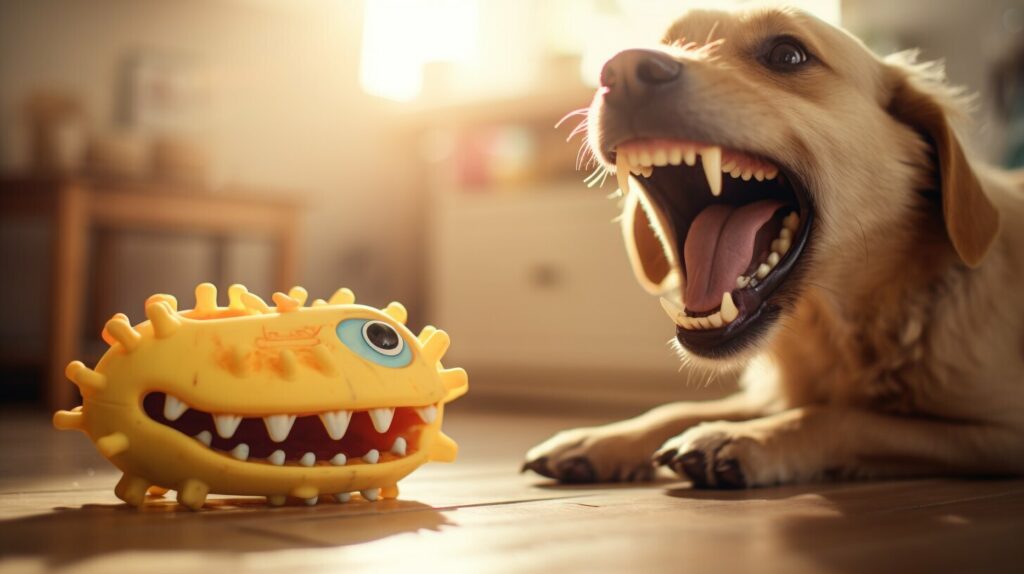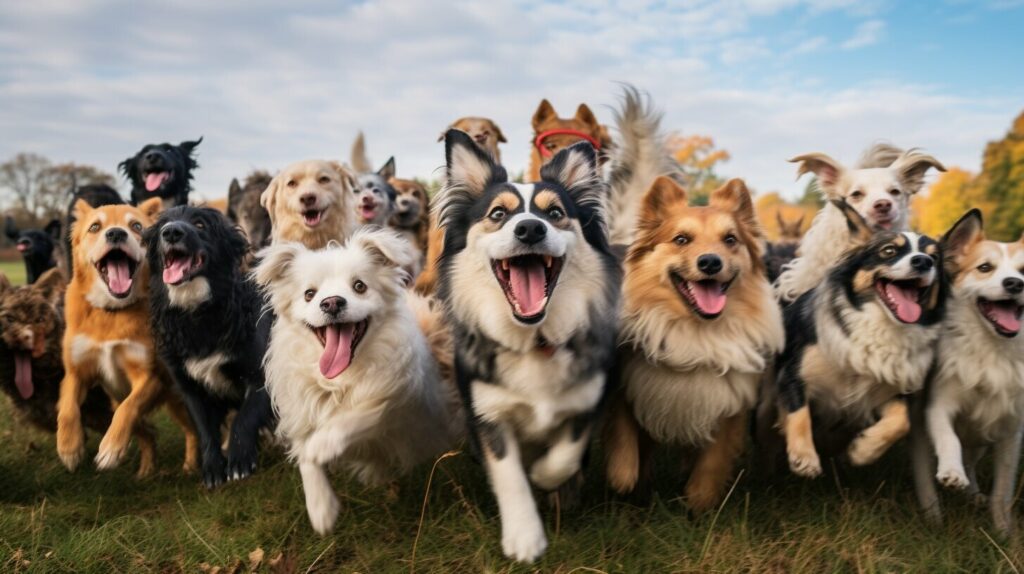As a dog owner, you love spending time with your furry companion, but you may have noticed that their breath sometimes smells less than pleasant. This can be a sign of poor oral health, and it’s important to understand why this happens and how you can prevent it.
Bad breath in dogs, also known as halitosis, can be caused by a variety of factors, including dental issues, poor oral hygiene, diet, and underlying health conditions. Just like humans, dogs need regular dental care to maintain good oral health and fresh breath.
Key Takeaways:
- Bad breath in dogs is often caused by poor oral health.
- Dental issues, poor oral hygiene, diet, and underlying health conditions can all contribute to bad breath in dogs.
- Regular dental care is crucial to maintaining good oral health and fresh breath for your furry friend.
Common Causes of Bad Breath in Dogs
As a responsible pet owner, you may have noticed that your dog’s breath smells unpleasant at times. While occasional dog breath odor may be normal, persistent bad breath in dogs can signal an underlying health issue that requires attention. Here are some common causes of bad breath in dogs:
| Cause | Description |
|---|---|
| Dental issues | One of the most common causes of bad breath in dogs is dental disease, which can range from mild tartar buildup to severe gum disease. |
| Poor oral hygiene | If you do not regularly brush your dog’s teeth or provide dental chews or other dental care products, food particles can accumulate in their mouth and lead to bad breath. |
| Diet | The food your dog eats can also contribute to bad breath. For example, diets high in protein can cause foul-smelling breath. |
| Underlying health conditions | Bad breath can be a symptom of certain health conditions such as diabetes, kidney disease, and respiratory infections. |
If you notice that your dog has persistent bad breath, it is important to consult with your veterinarian to determine the underlying cause and appropriate treatment.
The good news is that bad breath in dogs can often be prevented with proper dental care and hygiene.
The Importance of Dog Dental Care
Just like humans, dogs need regular dental care to prevent bad breath and maintain good oral hygiene. Neglecting your dog’s teeth can lead to a buildup of plaque and tartar, which can cause gum disease, tooth decay, and even lead to more serious health problems.
To keep your furry friend’s teeth healthy, it’s important to establish a dental care routine that includes regular brushing and professional check-ups. This will not only help prevent bad breath, but also ensure your dog’s overall health and well-being.
So, how often should you take care of your dog’s teeth? Experts recommend brushing your dog’s teeth at least 2-3 times a week, and scheduling a professional dental cleaning with your veterinarian once a year.
In addition to regular brushing and check-ups, there are other steps you can take to promote good dental health for your dog. Providing dental treats, using dental wipes, and incorporating specific foods into their diet can all help prevent bad breath and promote healthy teeth and gums.
Remember, investing in your dog’s dental health now can pay off in the long run, ensuring your furry friend enjoys fresh breath and a happy, healthy life.
Establishing a Dog Oral Hygiene Routine
Maintaining good oral hygiene is essential for preventing bad breath in dogs and ensuring their overall dental health. Here are some tips to establish an effective oral hygiene routine for your furry friend:
Brushing their teeth
Regularly brushing your dog’s teeth is one of the most effective ways to prevent bad breath and keep their teeth and gums healthy. Use a dog-specific toothbrush and toothpaste (human toothpaste can be harmful to dogs), and aim to brush their teeth at least 2-3 times a week. Start slowly, allowing your dog to get used to the sensation of having their teeth brushed, and gradually increase the frequency over time.
Using dental wipes
If your dog is resistant to having their teeth brushed, dental wipes can be a useful alternative. These wipes are specifically designed to remove plaque and food particles from your dog’s teeth and gumline. Simply wrap the wipe around your finger and gently clean your dog’s teeth and gums.
Incorporating dental treats
In addition to regular brushing and dental wipes, incorporating dental treats into your dog’s diet can also help maintain good oral hygiene. Look for treats that are specifically designed to promote dental health, such as those that contain enzymes to break down plaque and tartar.
By establishing a regular oral hygiene routine for your dog, you can help prevent bad breath and maintain their overall dental health. Remember to schedule regular check-ups with your veterinarian to monitor your dog’s oral health and address any potential issues early on.
Natural Remedies for Bad Dog Breath
If your dog has bad breath, you may want to consider natural remedies to help freshen their breath. These remedies can be used in addition to regular dental care practices, and can help keep your dog’s mouth healthy and smelling fresh.
1. Add Parsley to Their Diet
Parsley is a natural breath freshener that can be added to your dog’s food or given as a treat. This herb is high in chlorophyll, which can neutralize odors and fight bad breath.
2. Use Specific Products
There are a variety of products available that are designed to combat bad breath in dogs. Some examples include breath sprays, water additives, and dental chews. Look for products that are made with natural ingredients and avoid those that contain artificial additives.
3. Give Your Dog Crunchy Fruits and Vegetables
Fruits and vegetables that are high in fiber can help clean your dog’s teeth and freshen their breath. Some examples include carrots, apples, and celery.
4. Make a Natural Mouthwash
You can make a simple mouthwash for your dog by mixing 1 tablespoon of apple cider vinegar with 1 cup of water. This solution can be used to rinse your dog’s mouth after meals and can help kill bacteria that cause bad breath.
5. Look for Natural Remedies
There are a variety of natural remedies available that can help freshen your dog’s breath. Some examples include coconut oil, probiotics, and green tea. Be sure to do your research and choose remedies that are safe for your dog to consume.
Remember, while natural remedies can be helpful, they should not replace regular dental care practices. Continue to brush your dog’s teeth and schedule regular cleanings with your veterinarian to ensure that your dog’s mouth stays healthy and smelling fresh.
The Role of Diet in Canine Oral Health
The food your dog eats can have a significant impact on their oral health. Providing your furry friend with a balanced diet that is high in protein and low in carbohydrates can help prevent bad breath and promote healthy teeth and gums.
When choosing dog food and treats, be sure to look for options that contain natural ingredients and are free from artificial colors and preservatives. Avoid giving your dog table scraps or human food that can be high in sugar and contribute to dental issues.
Additionally, consider incorporating dental chews and toys into your dog’s diet, as they can help to remove plaque and tartar buildup while keeping your dog’s breath fresh. Consult with your veterinarian to determine the best dietary options for your dog’s specific needs and health condition.
Professional Dog Dental Care Options
While at-home dental care can significantly improve your dog’s oral hygiene, professional dental cleanings are also an important aspect of maintaining their dental health. Veterinarians can perform thorough dental cleanings that remove built-up plaque and tartar, as well as address any dental issues that may be contributing to your dog’s bad breath.
Regular dental check-ups can also help identify any potential issues before they escalate, allowing for early intervention and prevention of more serious dental problems. Your veterinarian can recommend a dental care routine that suits your dog’s specific needs and ensure that their dental health is monitored and maintained over time.
Additionally, there are dog dental services and dental clinics that specialize in professional dental cleanings and dental care options. These services can offer a range of treatments, such as dental x-rays and periodontal therapy, that can help combat bad breath and promote long-term dental health for your furry friend.
Remember, while at-home dental care is important, professional dental cleanings should not be overlooked. Regular check-ups and cleanings can help prevent more serious dental issues down the line and ensure your dog’s dental health is maintained over time.
Tips for Maintaining Fresh Dog Breath
If you’re looking for ways to keep your furry friend’s breath smelling fresh, there are a few things you can do:
- Provide appropriate chew toys: Chewing helps to promote saliva production, which can help reduce bad breath. Choose toys that are safe for your dog to chew on and that are designed specifically to promote dental health.
- Monitor their oral health regularly: Check your dog’s teeth and gums regularly for signs of tartar buildup, gum inflammation, or any other issues that could be contributing to bad breath. If you notice anything unusual, contact your veterinarian for advice.
- Supplement their diet: There are plenty of dog treats and supplements available that are formulated to promote good dental health and fresh breath. Look for products that contain ingredients like parsley, mint, or chlorophyll, which are known to have breath-freshening properties.
- Make sure they’re drinking enough water: Dehydration can lead to bad breath in dogs, so make sure your pet has access to clean, fresh water at all times.
- Brush their teeth: Regular brushing is one of the most effective ways to prevent bad breath in dogs. Use a dog-specific toothbrush and toothpaste to remove plaque and bacteria from your dog’s teeth and gums. Aim to brush their teeth at least once every two days.
- Consider professional dental cleanings: If your dog has a lot of tartar buildup or other dental issues, your veterinarian may recommend a professional cleaning. This involves putting your dog under anesthesia and scraping away any buildup from their teeth and gums.
By following these tips, you’ll be well on your way to helping your dog maintain fresh, healthy breath. Remember, good oral hygiene is essential for your pet’s overall health and well-being!
Overcoming Challenges in Dog Dental Care
While keeping your dog’s dental health in tip-top shape can be challenging, it’s crucial to ensure your furry friend stays healthy and happy. Here are some common challenges dog owners face when it comes to dental care and how to address them:
- Resistance to brushing: Some dogs may initially resist having their teeth brushed. It’s important to start slowly, using a soft toothbrush and tasty toothpaste. Gradually increase the duration of the brushing sessions over time, and reward your dog with treats and praise to make it a positive experience.
- Difficulty examining teeth: It can be tricky to get a good look at your dog’s teeth, especially if they are uncooperative. Try to gently hold their muzzle and lift their lips to examine their teeth and gums carefully. You can also ask your veterinarian for tips on how to make the process easier.
- Financial constraints: Some dog owners may struggle with the costs associated with professional dental care, such as cleanings or extractions. However, investing in your dog’s dental health can prevent more expensive health issues down the road. Talk to your veterinarian about payment plans or financing options to make it more manageable.
- Limited time: With busy schedules, it can be tough to fit regular dental care into your routine. Try to establish a set time each day to brush your dog’s teeth or incorporate dental treats and toys into their daily routine. This way, it becomes a habit and doesn’t feel like an extra task.
By overcoming these challenges and making dental care a priority, you can ensure your dog’s dental health remains in top shape, preventing bad breath and more serious health issues in the future.
Maintaining Your Dog’s Dental Health Long-Term
Consistency is key when it comes to your dog’s oral health. By establishing a regular dental care routine and sticking to it, you can help prevent bad breath, tooth decay, and other oral health issues. Here are some tips for maintaining your dog’s dental health long-term:
- Regular check-ups: Just like humans, dogs should have regular dental check-ups with their veterinarian. This can help catch any potential dental issues early on and prevent them from progressing.
- Brushing: Brushing your dog’s teeth regularly is one of the most effective ways to maintain their dental health. Use a toothbrush and toothpaste designed specifically for dogs, and aim to brush their teeth at least a few times a week.
- Dental treats: Incorporating dental treats into your dog’s diet can help reduce plaque and tartar buildup, as well as freshen their breath. Look for treats that are specifically designed to promote dental health.
- Chew toys: Providing your dog with appropriate chew toys can help keep their teeth clean and healthy. Look for toys that are designed to promote dental health, such as those made from rubber or nylon.
Remember, maintaining your dog’s dental health is an ongoing process. By staying consistent and proactive, you can help prevent bad breath and other oral health issues, ensuring your furry friend stays happy and healthy for years to come.
Conclusion
Bad breath in dogs is a common problem, but it doesn’t have to be. By understanding the causes of bad breath in dogs and taking steps to maintain good oral health, you can help your furry friend stay happy and healthy for years to come.
Regular dental care, including brushing your dog’s teeth and providing chew toys, is crucial to preventing bad breath and other oral health issues. Additionally, choosing the right diet and incorporating natural remedies can help freshen your dog’s breath.
Remember, maintaining your dog’s dental health is a long-term commitment. By establishing a consistent oral hygiene routine and addressing any challenges that may arise, you can help ensure your dog’s oral health stays in top shape throughout their life.
So don’t ignore your dog’s bad breath – take action today to keep your furry friend healthy and happy!
FAQ
Q: What are the common causes of bad breath in dogs?
A: Bad breath in dogs can be caused by dental issues, poor oral hygiene, diet, and underlying health conditions.
Q: Why is dog dental care important?
A: Regular dental care for dogs is crucial for their overall health and well-being.
Q: How can I establish a dog oral hygiene routine?
A: You can establish a dog oral hygiene routine by regularly brushing their teeth, using dental wipes, and providing dental treats.
Q: Are there any natural remedies for bad dog breath?
A: Yes, natural remedies for bad dog breath include adding parsley to their diet and using specific products designed to combat bad breath.
Q: How does diet impact canine oral health?
A: Diet plays a significant role in your dog’s oral health. Choosing appropriate dog food and treats can help promote good breath and dental hygiene.
Q: What are the professional dental care options for dogs?
A: Professional dental care options for dogs include dental cleanings performed by veterinarians and regular dental check-ups.
Q: How can I maintain fresh breath for my dog?
A: You can maintain fresh breath for your dog by providing appropriate chew toys and monitoring their oral health regularly.
Q: What are some common challenges in dog dental care?
A: Common challenges in dog dental care include resistance to teeth brushing and difficulty accessing certain areas of the mouth. However, there are practical solutions to overcome these challenges.
Q: How can I maintain my dog’s dental health long-term?
A: Consistent and ongoing dental care practices are essential to maintaining your dog’s dental health throughout their life.



